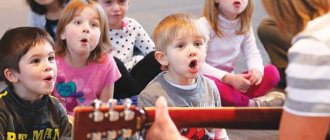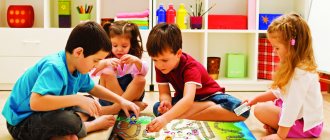Identification and support of gifted children in modern preschool educational organizations
Andrievskaya Inna Viktorovna head Pustovaya Svetlana Viktorovna senior teacher MBDOU "Borisov kindergarten "Yagodka" Belgorod region
Identification of gifted children based on observation, study of psychological characteristics, speech, memory, logical thinking and work with gifted children should become one of the most important aspects of kindergarten activities.
For all children, the main goal of education, upbringing and development is to provide conditions for the disclosure and development of all abilities and talents with a view to their subsequent implementation in professional activities.
When deciding on the organizational forms of work with gifted children, it should be recognized as inappropriate to separate such students into special groups. Gifted students should be raised and developed in groups with other children. This will create conditions for the further social adaptation of gifted children and at the same time reveal the hidden talents of other students.
The main goal is to create conditions for building an educational process aimed at the productive mental, intellectual, and creative development of gifted children, at the realization and improvement of their abilities.
Main areas of work of the preschool educational institution
- Creation of a data bank of children with prerequisites for various types of giftedness.
- Increasing the level of individual achievements of children in mental, creative and other areas of activity for which they have the ability.
- Identification of the dynamics of development of productive creative thinking in children with general giftedness.
- Creation of a “Portfolio of a Gifted Child” in a preschool educational institution.
- Introduction into the educational space of a kindergarten of an alternative option for the education and development of gifted children through an individual development trajectory.
- Increasing the professional competence of teachers on current issues in the pedagogy of giftedness.
- Creating conditions for the successful socialization of children with a high level of actualized talent in society as the basis for the development of their inclinations, abilities, and talents.
Advertising message
Currently, the attention of many psychologists and teachers is attracted by the problem of children's giftedness, its nature, the possibility of identifying and creating special educational programs for gifted children. At the same time, diagnostics of giftedness and work with gifted children are based on the data obtained in special studies.
The initial prerequisite for the development of abilities is innate inclinations.
Any inclinations must go through a long development path before turning into abilities. The first years of a child’s life are the most valuable for his future, and we must use them as fully as possible.
When creating favorable conditions in a preschool educational organization during the period of preschool childhood, a child can go from the first manifestations of inclinations to the bright blossoming of abilities and giftedness.
The main conditions under which the development of a child’s giftedness will be most effective:
- the presence of specially trained, highly qualified additional education teachers and educators;
- the presence of a rich subject-development environment that stimulates a wide variety of child activities;
- creating an atmosphere of goodwill and caring towards the child, an environment that creates a child’s sense of self-worth and encourages the manifestation of his individuality;
- the presence of a personality-oriented educational system, which includes developmental programs in various areas of children's giftedness, taking into account both the personal and age characteristics of the child;
- introduction of a system of psychological and pedagogical monitoring aimed at identifying the special abilities of children and tracking their further development;
- the use of various non-traditional methods and techniques, gaming technologies in the work of teachers;
- supporting children's initiative in various activities;
- the work of clubs and sections that develop the child’s creative orientation;
- participation of children in various holidays, sports competitions, role-playing games, exhibitions of children's creativity;
- close cooperation with families on the development of giftedness in their children;
You can also recommend that parents attend clubs and sections outside the kindergarten. Participation in creative events between children's institutions, such as the festival "Mosaic of Childhood", "Nadezhda" and others, well stimulates children for further creative development.
Abilities, unlike inclinations, are an acquired quality. It is during the years of childhood (as opposed to adulthood) that the internal conditions for the formation of age-related development are simultaneously factors in the formation of abilities. Even a child’s weak abilities can be developed if you work with him purposefully and systematically. At the same time, good abilities, incl. Giftedness that does not receive constant confirmation can be erased over time.
The first years of a child’s life are the most valuable for his future, and we must use them as fully as possible. It is important to create a favorable psychological environment for the child’s activities, to find words of support for new creative endeavors, and to treat them with sympathy and warmth. Carefully, affectionately and unobtrusively support the child’s desire for creativity. In case of failures, he needs sympathy, and in no case should one speak disapprovingly of the child’s creative attempts.
Ability exists only in development; this development is carried out in the process of one or another practical or theoretical activity. During the 7 years of preschool childhood, the child’s rapid physiological and mental development occurs, and here his first inclinations and abilities appear, including creative ones, which should be noticed in time.
Creating conditions for the optimal development of gifted children, including children whose talent may still be emerging at the moment, as well as simply capable children for whom there is serious hope for a further qualitative leap in the development of their abilities, is one of the main directions of the work of preschool educational institutions.
The teaching staff must be aware of the relevance and importance of working with children with increased motivation to learn and gifted children, create conditions for the development of children's giftedness, to accompany their advancement based on the principle of individualization and differentiation of training, education and development. Work in this direction should contribute to the successful integration of the child into modern society.
The results of developing creative abilities can be best when the family and kindergarten work closely together. If parents realize the importance of their influence on the development of the child’s personality and learn to organize the family’s free time, directing it to the development of the child’s creative abilities. But as surveys and questionnaires of parents show, a child’s home life is not particularly conducive to the development of the child’s creative potential. The vast majority of parents put educational and disciplinary values first. Therefore, preschool institutions are tasked with solving the important task of creative development of children, identifying talent and supporting the individuality of a preschooler.
THERE ARE LEFT UNTIL THE NEW YEAR 2021...
Gifted children in kindergarten
Anastasia Doroshenko
Gifted children in kindergarten
Gifted children in kindergarten.
A little artist whose paintings are admired by the whole world. A little mathematician adding and multiplying huge numbers in his head. A small athlete with great achievements, who just recently took the first uncertain steps in his life. A little musician who soulfully performs complex works, sometimes inaccessible even to adults.
In preschool childhood , there are as many types of giftedness as there are types of children's activities . Each activity has its own scale of success and originality of achievements. Children's talent begins to manifest itself from a very early age. But will a gifted personality ? After all, signs of giftedness that appear in preschool age may gradually fade away if appropriate conditions are not created that stimulate the development of giftedness . Therefore, preschool teachers should be especially attentive to children who are beginning to show the beginnings of giftedness .
Giftedness is most often interpreted as a qualitatively unique combination of abilities that ensures the successful implementation of activities. This individual psychological feature is characterized as a systemic quality of the psyche that develops throughout life, allowing one to achieve high results. A gifted child is a child distinguished by obvious, sometimes outstanding achievements (or having internal prerequisites for such achievements)
in one or another type of activity, the intensity of expression and brightness of which distinguishes him from his peers.
But a gifted child is often particularly vulnerable.
With his unusualness, it is not easy for him among his peers. Therefore, the task of teachers is to help the child not only discover his talent, but also build relationships with others. Gifted children are prodigies , capable, talented, brilliant. They are called differently. But the essence lies in one thing - the phenomenon of children's giftedness . Giftedness is , of course, the most precious natural gift, which sometimes turns out to be too heavy a burden for its owner and creates many problems. Giftedness is like a diamond , which will sparkle with its facets only after being in the hands of a master. No matter how gifted a child , he needs caring and attentive teachers who will give his natural gift a brilliant shine.
How to identify a gifted child ? A child with the beginnings of giftedness has certain signs of giftedness that are characteristic of his developing personality and distinguish him from his peers:
high level of development of speech and thinking, originality and non-standard thinking; increased attention span, ability for long-term concentration;
having a good memory;
manifestation of passion, curiosity, high cognitive activity, breadth of interests;
high level of learning ability, enjoyment of the learning process;
independent choice of occupation, the desire to bring one’s activities to meet high requirements;
creativity, vivid imagination, receptivity to everything new and unusual;
independence, independence, self-confidence;
increased sensitivity, excitability, vulnerability, hyperactivity, constantly attracting the attention of others.
Not all teachers and parents manage to understand and accept such children. Their attitude towards such children is ambiguous. The appearance of a child with signs of giftedness in some families evokes in parents feelings of joy, admiration, and a desire to actively promote his development and grow themselves; in others - confusion, failure to interact with a bright and unusual baby who is different from his peers. Difficulties in communicating with such children and their rejection are sometimes observed in kindergarten . Not everything is so simple and easy when there is a non-standard child in the group who shows signs of giftedness . It is bad if such a child remains misunderstood and unaccepted for who he is, with all his characteristics. No matter how difficult it may be for a teacher to communicate with such a child, he must try to a large extent to change the difficult situation, to paint it in a positive color - the color of joy, happiness from communicating with a miracle, open to the world, unfolding before his eyes, from the awareness of involvement to that.
Currently, various types of human talent . These include intellectual, artistic, creative, psychomotor, social (leadership, communication, which manifest themselves already in the preschool period. Parents and teachers usually take care of the child’s mental abilities and giftedness in musical and visual activities. Little attention is paid to the development of social talent , which manifests itself in communication, but it is precisely social giftedness that can become an impetus for the development of abilities at a higher level.
As modern research shows, those who achieve great success in their lives are not always those who have developed mental abilities, but, as a rule, people who have the ability to easily communicate, establish favorable interpersonal relationships, have pronounced leadership qualities and organizational abilities, as well as who know how to choose the right area of their activity and move towards the intended goal.
Children with the beginnings of social giftedness are found in kindergarten more often than with other types of giftedness .
Kindergarten is the first social institution in which the social and personal development of a child begins. It is in the kindergarten the child begins to learn all the subtleties of interaction and communication with surrounding adults and children.
Identifying gifted children in a group of children is a problem that has long attracted the attention of psychologists, teachers and parents. However, today it remains largely unresolved; it is considered urgent, particularly complex, and requires increased attention. All researchers of the issue of children's giftedness recognize the need for the earliest possible identification of gifted children in the children's team in order to create conditions for the development of their talent. However, the difficulty lies in the fact that there is no unambiguous attitude towards the very process of early identification of giftedness .
When meeting the pupils of a new group for the first time, we can determine is gifted or whether his difference from other children is due to the characteristics of his upbringing and early development in the family. Identifying children with signs of giftedness is a long-term process associated with an analysis of the developmental characteristics of each individual child. You can direct your work to search for gifted children in the process of joint activities, communication, and independent activities of children that correspond to their interests.
As a result of observations, the child’s abilities, inclinations and interests are revealed. We pay special attention to children who ask a lot of questions, are interested in those around them, and are aware of things that are of no interest to their peers. We highlight children who quickly remember what they read and were told by adults, react emotionally to everything new, think originally and offer unexpected answers and solutions.
Children whose development was not involved in the family, as a rule, are not able to find and make non-standard decisions in difficult situations. And gifted children turn out to be independent, energetic and independent. They have a rich vocabulary associated with early language acquisition. They are capable of word creation and have great speech activity. At an early age, such children are good at tracing cause-and-effect relationships and drawing certain conclusions. They can be entrusted with a more complex task, which they will approach responsibly if they are interested in it. To do this, we offer them situations whose solution requires initiative and innovative thinking. If such children develop a high level of cognitive interest, they will become assistants to adults in any endeavor. Supporting and developing the individuality of a gifted child , without slowing down the growth of his abilities, is one of the important tasks facing preschool teachers. Particular attention should be paid to the development of socially gifted children . After all, it is in the preschool years that social giftedness begins to manifest itself and develop, as evidenced by the results of various studies in this area.
for the development of social giftedness during preschool childhood . At this time, self-awareness, the need to communicate with adults and peers, the ability to empathize, empathy are actively being formed, social emotions and feelings are developing. A preschool group is the first children's community in which communication and various types of children's activities , a new social role is mastered - a member of a children's group , and relationships with peers are formed.
Socially gifted children are always leaders in a children's team . They exhibit early leadership qualities that contribute to the unification of the children's micro-team . They are distinguished by their activity, pronounced interest in people, and the need for communication. It is communicatively gifted children who become the initiators of interaction in the group. A gifted child often takes on the role of organizer of a group game. Having good speech, he can tell the teacher what other children , who at this stage find it difficult to express their thoughts. Such children always show a willingness to help their peers with advice or action, they are able to resolve emerging conflicts. Most of the children in the group want to communicate and be friends with them. However, gifted children quickly understand their superiority over others, which allows them to often command children, choose games at will, and set their own rules.
It is also necessary to pay enough attention to the development of the communicative qualities of socially gifted children . The development of communication occurs most clearly in creative activities: in acting out role-playing dialogues, staging poems, performing etudes, dramatizing works of art, role-playing and director's play.
Gifted children clearly understand how any game can be organized, they know how to create conditions for games: they choose a place, assign roles, find the necessary toys, determine the content of the game and always bring something new into the game. Such children participate with interest in conversations on the topic of the upcoming game, ask adults a lot of questions in order to learn something new, and are happy to share their impressions with everyone around them. Vivid impressions allow gifted children to take a more responsible approach to fulfilling their play role. They are inventive in their actions with toys, imitate their voices and have conversations with them; their activities are emotional in nature. More often than not, gifted children take on leading roles and perform well in them. They can only invite those they want to the game and get upset if they don’t agree with them on something. They often show inflated demands on their peers, striving for leadership. Therefore, the task of teachers is to explain to a gifted child that it is necessary to take into account the opinions of peers. Such a child should not feel superior to other children, so teachers use the technique of subsequent discussion of the game actions of all participants in the collective game.
For the early development of social talent of preschoolers, you can create problem-speech situations, conduct communicative games, game exercises for the development of the emotional sphere, sketch games, organize ethical conversations, read and discuss fiction, stimulate children’s activity in creative games, during the work of creative workshops , spend holidays and entertainment.
It is generally accepted that the main factor in the development of social giftedness at an early age is the family. A favorable atmosphere in the family, trusting relationships with parents and other family members influence the development of social interest in the child. Social talent is formed in children in families with a democratic style of communication between adults and each other and with children, where personal communication and spending time together are valued. Children are given the opportunity to make independent actions and decisions, but there is also a certain reasonable control over their actions.
The development of giftedness is facilitated by the high interest in constantly learning new things among the parents themselves, who, as a rule, are not only employed in the field of intellectual professions, but also have various kinds of intellectual hobbies. When communicating with a child, they always go beyond the circle of everyday problems, devoting their free time to joint cognitive activities - common games, discussing interesting issues, solving intellectual problems. Often parents and children are united by common cognitive interests, on the basis of which stable friendships arise between them. In these families, there is a significantly smaller distance between parents and children, the very fact of reduction of which can have not only clearly positive, but sometimes also negative features. In many cases, it is the parents who begin to teach a gifted child , and often one of them becomes his mentor for many years in a variety of activities: artistic and aesthetic, sports, music.
However, even the best intentions of parents can play both a positive and negative role in the development of a gifted child . Therefore, specialists working with such children need to pay special attention to the family in order to help parents find ways to solve problems that often occur when raising a gifted child .
Parents themselves have different attitudes to the problem of their own children's giftedness . Some believe that there is no need to pay attention to a child’s curiosity, imagination, and creativity, since this is related to the characteristics of age. Others, on the contrary, exaggerate the child’s capabilities, thereby emphasizing that their baby is not like everyone else, that his talent gives him the right to special privileges. They constantly tell the child about his exclusivity, putting him above all other children. It is necessary to explain to parents that this approach to education is not correct, because the child should become a part of society, and not stand out from it. It is important that parents understand that the child must have a healthy sense of self and an understanding that other children's abilities and interests may be just as worthy of consideration as their own. But in any case, a gifted child has the right to expect that his talent will find understanding and support, first of all, from his parents.
talent needs constant development. She is like a plant that needs to be nurtured with love. Without care and attention, it fades away. Therefore, it is necessary to strive to unite our efforts together with the family in activities for the upbringing and development of gifted children . And perhaps there will be more gifted children .
Features of the work of a preschool teacher with gifted children and their parents
In artistic activity, a gifted child manifests himself earlier than in other areas (up to a year and a little later): he begins to draw early, spends a lot of time sculpting and designing, has his own style of depiction;
In the motor sphere, giftedness manifests itself in the form of good hand-eye coordination; the child is unusually dexterous, strong, and coordinated (these are children who are potentially gifted in dancing and sports).
Absolutely all gifted children experience a great need for mental stress and high mental activity.
The main tasks of accompanying gifted children in kindergarten are the following:
Creating conditions for the development of a gifted child. This problem is solved by means of research, development, methodological, and organizational work.
Creating conditions for the development of the subject position of a gifted child. This problem is solved by means of interaction in the teacher-child-parent system.
Tracking the developmental characteristics of a gifted child at various age stages of preschool childhood. This problem is solved mainly by means of pedagogical and psychological diagnostics and developing pedagogical activities.
Problems of gifted children
Lack of interest in group activities
This attitude often appears because the program designed for the average child is too simple, boring and uninteresting for the “gifted”.
Difficulty communicating with peers
Gifted children like complex games and are not interested in those that their classmates are interested in. As a result, a gifted child prefers to play alone and avoids emotional and social contacts with children.
Denial of social norms and general group rules
Gifted children do not strive to “be like everyone else” and reject standard requirements, especially if these standards run counter to their interests.
Dive into philosophical problems
It is common for gifted children to think about such things as death, the afterlife, religious beliefs, and philosophical issues. This can lead to excessive shyness and exaggerated fears.
The pursuit of excellence
Gifted children are characterized by an internal need for perfection. Hence the feeling of dissatisfaction, personal inadequacy and low self-esteem.
Need for adult attention
Due to the desire for knowledge, gifted children often experience an increased need for communication and attention from adults. This causes friction in relationships with other children. Gifted children are often intolerant of children who are inferior to them in intellectual development. They may alienate others with remarks that convey contempt or impatience.



